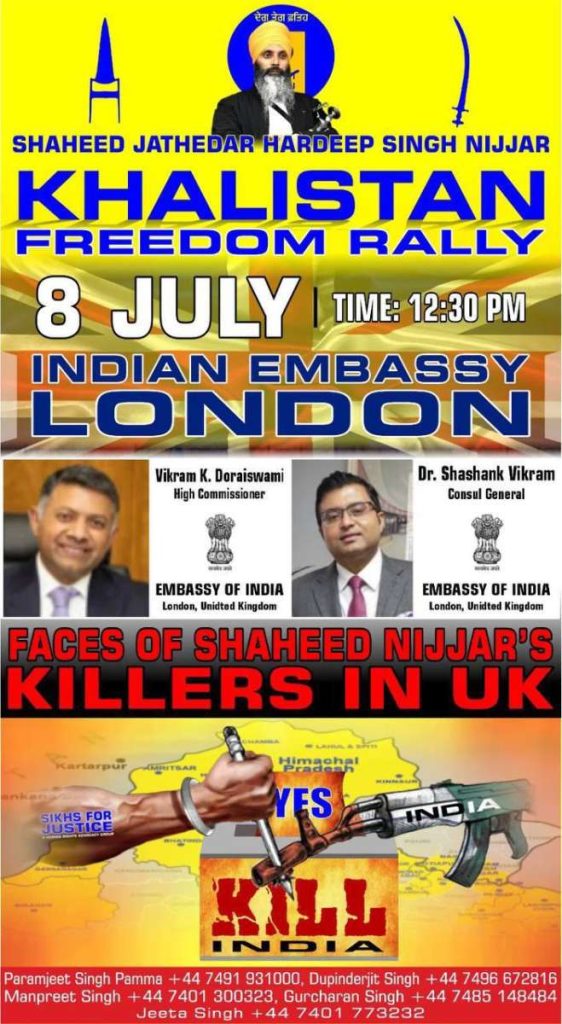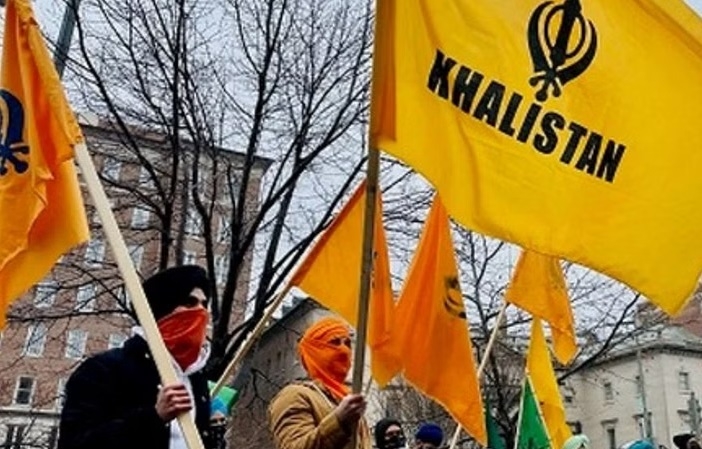The External Affairs minister S Jaishankar has warned Justin Trudeau government that inaction on his part can strain diplomatic relations…reports Asian Lite News
Continuing its poster war, Khalistani radicals have now released another one in the UK bearing pictures of top Indian diplomats– High Commissioner Vikram K Doraiswami and Counsel General Dr Shashank Vikram. The emergence of these posters is a sequel to the ones that appeared in Canada, Australia and USA threatening top Indian diplomats.
A video of Khalistani radicals setting the Indian Consulate on fire in San Francisco was released on social media yesterday, which led to a major uproar. The latest poster that is going viral on social media also gives a call for a protest march called ‘Kill India’ by Khalistanis on July 8 and has names and numbers of the organisers. The rally is being called by the banned radical outfit Sikhs For Justice (SFJ) whose supremo terrorist Gurpatwant Singh Pannun continues to be in hiding after one of the key leaders Hardeep Singh Nijjar was gunned down in Canada.
Highly placed sources reveal that the rally, posters and arson attempt is part of ‘Operation 21’ announced by Pannun on June 30 at a meeting held in Canada. Sources also claim that a decision was taken at this meeting not only tarnish India’s image through a campaign in many different countries including Canada, Australia, America, UK, Germany, France and New Zealand, but also to protest violently at 21 embassies. The Khalistani supporters spread in different countries in the world have been asked to form groups of twenty-one people each, who will ensure their voice is ‘heard outside embassies’.
Slated to be backed by ISI and terrorist outfit Babbar Khalsa International (BKI) the operation is being cited as the last desperate attempt by the Khalistanis to stay relevant after constant crackdown by Indian law enforcement agencies and elimination of their leaders apparently due to internal gang wars. The radical movement has lost three key leaders Paramjit Singh Panjwar, Avtar Singh Khanda and Hardeep Nijjar in the last two months. While Khanda died owing to oncological complications the other two were gunned down by unidentified assailants.

Indian authorities meanwhile have reached out to UK and US counterparts and summoned the Canadian High Commissioner to India, issuing a demarche citing the country’s apparent inaction against growing anti-India activities by Khalistani groups. The External Affairs minister S Jaishankar has warned Justin Trudeau government that inaction on his part can strain diplomatic relations.
Though times have changed and Indian approach to foreign based terror is far more proactive, some former diplomats nevertheless cite the ‘Mhatre moment’ of 1984. Ravinder Mhatre was a 48 year old Indian Diplomat in the UK who was assassinated by Kashmiri separatists. It was alleged that despite repeated alarms, the Birmingham Police did not take the complaint about his abduction by separatists seriously and his body was found 48 hours later with two bullet shots in the head and body. “Canada’s response to the Indira Gandhi float and these posters remind us all of the 1984 response of UK police then. The country needs to wake up to the threat voiced by India multiple times during this year,” said a former diplomat.
ALSO READ-‘Snakes in our backyard’, Indo-Canadian MP hits back at Khalistanis

